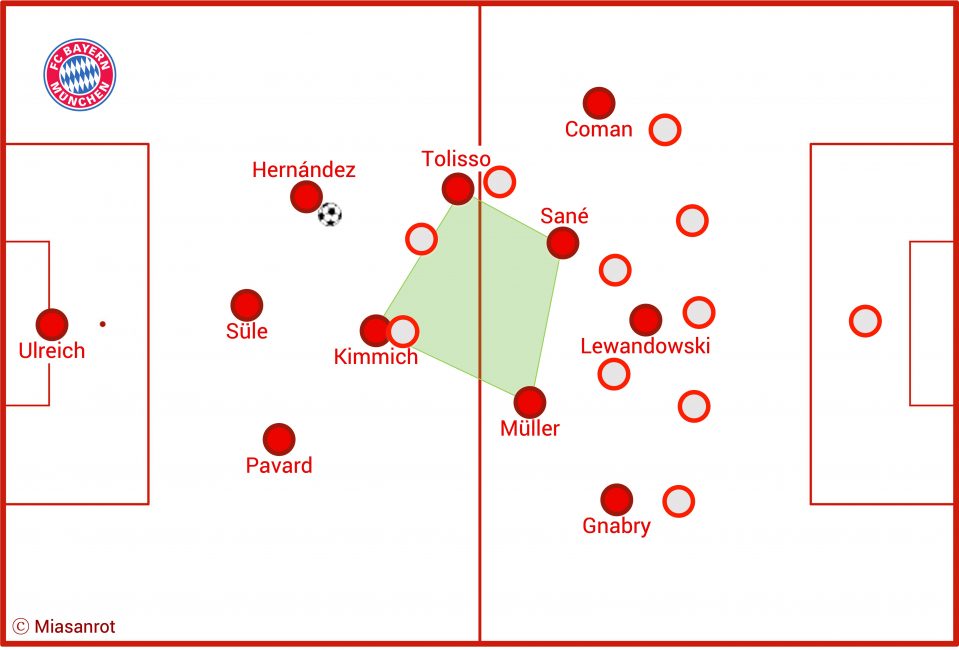FC Bayern Rondo: Preview vs. Bochum + what else happened this week
For the men, the hot phase of the season begins – with an away game at Bochum being on this Saturday. Then with Salzburg on Wednesday the first match of this season’s Champions League knockout-stages awaits. This marks the opening to those weeks in a football calendar year that traditionally decide over the successfulness of an entire season. At the pre-Bochum press conference, Julian Nagelsmann seemed as relaxed as ever and answered the journalists’ questions in his customary joviality.
For example, he was asked about Tanguy Nianzou, who despite the huge talent he is nearly universally attested as having has not really made an impact this season and whose development seems to be stagnating. He could have said anything in response to circumnavigate the thrust of the question: Injuries, match practice, young player – there are many understandable and undeniable reasons why the 19-year-old has not yet had a breakthrough at FC Bayern.
And Nagelsmann, of course, cited all of that. “Of course, that also has to do with playing practice. That’s where you also have to look at yourself as a coach,” he said in his usual diplomatic way, not refraining from a bit of self-criticism. However, he said, ultimately the development had to be pushed forward by the player too.
That is why he took his player to task at the same time: “Time and again, he has moments when he plays outstanding passes into the midfield building up from the back,” Nagelsmann began, before explaining why the Frenchman is not yet far enough: “But there are also situations, like after when he came on against Cologne, when he makes big mistakes. He still lacks reliability.”
Nianzou criticism actually applies to everyone
This statement is interesting for several reasons. On the one hand, it criticises a very young player in no uncertain terms, yet without pillorying him. On the other hand, the criticism applies to larger parts of the entire squad. Even if we are talking about Nianzou here, Nagelsmann’s criticism would hold just as true for all other FC Bayern centre-backs, too – each in a different area. Benjamin Pavard, Niklas Süle, Dayot Upamecano, Lucas Hernandez – they have all played crucial misplaced passes this season, or otherwise committed at least minor errors at times.
Among them, Hernandez is still the most consistent when it comes to the core tasks of a central defender: defending, winning balls, closing spaces, closing down opponents, protecting teammates – here the Frenchman is already one of the best in the league and in Europe. But when it comes to build-up play, he fluctuates between world class and Sunday league. Nevertheless, he is Bayern’s most reliable defensive player this season. But it would be good for the team if they also had a passer of a consistently high standard in defense. Just as Javi Martínez once had players with strong passing skills next to him.
Süle, Upamecano and Pavard are responsible for at least one badly misplaced pass in almost every game, which should not happen in the early phase of the build-up play. Against Leipzig, for example, Süle from a central position attempted to play a very risky vertical pass through four Leipzig players in the first half, which was intercepted and resulted in a good chance for the opponent. In this situation, a diagonal pass to Müller would have made more sense and been harder to defend because of the angle.
FC Bayern continue to struggle with build-up play
Mistakes happen even at Bayern, that is normal. But for the level Bayern are at, the rate is too high. It is not high enough to detect statistically significant differences – they have been recording just slightly fewer vertical passes, a few metres less space gained on average and similar passing rates since the 2017/18 season. The problems are hard to pin down in numbers. But they are there and they have been costing FC Bayern unnecessary goals against for some time now.
Unnecessary because most of the goals do not necessarily result from a weak defensive game, but rather from a careless possession game. Bayern’s sharpness of passing, accuracy of passing and the number of vertical, line-breaking passes are probably unparalleled in the Bundesliga, but even a team like Leipzig can punish mistakes when they are made too often. How would that look against top European teams?
The big question is how much Nagelsmann can work on it, or whether he ultimately has to accept that this is the type of player that he has at his disposal, who reach their limits in build-up play. If one player is good for a mistake every now and then, a team can absorb that. But if there are several of them, the mistakes pile up and so does the probability of conceding simple goals.
Little handicap?
Unfortunately, this also extends to central midfield. One player who keeps appearing in all the top statistics in the “passing game” category is Thiago. As much as it may annoy some Bayern fans, his quality has not been adequately replaced. Joshua Kimmich alone cannot do that.
And as justified as the criticism of Alaba and Boateng’s defensive behaviour was at times: their now missing qualities in build-up play have not yet been adequately compensated for either. “Yet”, because Bayern have talented central defenders in their ranks. Young players who can still develop. In the Champions League, however, that hole in ability could turn out to become a handicap this season.
It could already do so as early as Bochum. Bochum play with a lot of risk. That can go wrong, as it did in the reverse fixture, but it can also put even the best teams in the league in uncomfortable situations. The 1-1 draw against Borussia Dortmund in December is a good example.
Nagelsmann and the question: is the system a problem?
The question of defensive stability goes hand in hand with the question of what system Nagelsmann uses. In the last match, Nagelsmann opted for a 3-2-4-1 formation against an offensively strong Leipzig side.

The midfield quartet of Kimmich, Tolisso, Sané, and Müller repeatedly formed a diamond – aligned in different directions depending on the situation. The goal was to use the spaces next to the opposing double pivot in midfield. And that worked rather well. Again and again, Bayern found passing routes to Müller, who kept making himself available on the far side of the ball, who then turned up the heat.
In gegenpressing, they were also full of pressure in the front third. Since Tolisso often played higher than Kimmich, Bayern sometimes had six players with whom they disrupted Leipzig’s build-up play. This led to a lot of ball wins – especially right before some of the goals.
The build-up was more problematic. The build-up formation of Hernández, Süle, Pavard, and Kimmich gave away too many simple balls resulting in counterattacks, which allowed Leipzig to switch to the wings directly because Coman and Gnabry are … well, they are not wing-backs, they are wingers. And when working back, the ways are automatically long. Nevertheless, Nagelsmann rightly points out that they are also rather wide in a 4-2-3-1. Sometimes, in this setup there are even fewer players at the back than with a three-man backline. Therefore Nagelsmann usually defends his offensive approach.
But the system requires the utmost precision. Precision that Bayern currently do not have. This affects not only the centre-backs, but also the rest of the team. An average pass rate of 84.9% is good – especially when you take as many risks as Bayern do. But it takes more to take that kind of risk. Already against Leipzig, the game could just as easily have ended in a 5-4 or 3-3 scoreline. Nagelsmann is therefore faced with the question of whether his system is not (yet) suitable for the players he has available.
Bayern women face landmark match
For the Bayern women, in contrast, a draw would already mean a likely end to their title ambitions. This weekend, however, they have a great chance to temporarily take the lead from Wolfsburg. Their match against SC Sand has been cancelled due to too many SARS-CoV-2 cases among the opponents.
The Bavarians, however, have to solve their task first. Some teams have been tripped up by SC Freiburg already. This season they already got a 2-2 draw against Wolfsburg and recently won 2-1 against Frankfurt. Sitting in the dead middle of the table, their performances this season have been a mixed bag, but on good days it is difficult for any team to crack their defence. Freiburg are aggressive, but at the same time manage to close the gaps quickly when they have been drawn apart. They always have problems shifting here and there when opponents act at a high tempo, though.
Despite the 4-0 victory over Sand, Bayern did not start the new year as confidently as the results suggest. Sand came up with a few counterattacking opportunities, especially in the first half. Just like the men, the women gave away some balls carelessly and so the duel between the championship wannabes and the almost certainly relegated women from Sand seemed like a match of equals in some phases. Even if only in a few.
Bayern can take the lead
Bayern will need to step up their game against SC Freiburg. Jens Scheuer’s team lacks pace and variety, especially in possession. Of course, it is difficult to call up these qualities so shortly after the winter break. Especially as there have been and still are a few absences. But that makes it all the more important to get back into the rhythm now.
Scheuer’s big task for this second half of the season will be to reduce the team’s dependence on width. Lea Schüller was not well integrated into the offensive game against Sand, many attacks passed her by. However, her integration will be important in order to give the game more variety going forward.
Going into the three-week league break with the lead in the standings would also be important – for confidence, but also to signal to VfL Wolfsburg that it will once again take until the very end before the title race is decided. “Women’s Bundesliga” is once again a moniker for “excitement” this season.









